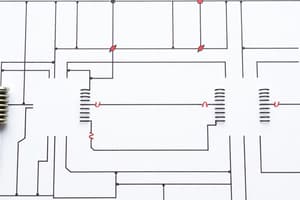Podcast
Questions and Answers
根据欧姆定律, 当电压和电阻保持不变时, 电流的变化与什么成正比?
根据欧姆定律, 当电压和电阻保持不变时, 电流的变化与什么成正比?
- 电阻的平方
- 电压的平方
- 电压 (correct)
- 电阻
在串联电路中, 以下哪一项描述是正确的?
在串联电路中, 以下哪一项描述是正确的?
- 各元件的电压相等, 电阻也相等
- 各元件的电压相加, 但电阻不相加
- 各元件的电压相减, 电阻相加
- 各元件的电压相加, 电阻也相加 (correct)
在并联电路中, 以下哪一项描述是正确的?
在并联电路中, 以下哪一项描述是正确的?
- 电流在各支路中相等
- 电压在各支路中相等
- 电流在各支路中不同, 电压在各支路中相等
- 电流在各支路中相等, 电压在各支路中不同 (correct)
如果一个5欧姆的电阻与一个10欧姆的电阻串联, 则总电阻为多少?
如果一个5欧姆的电阻与一个10欧姆的电阻串联, 则总电阻为多少?
如果一个5欧姆的电阻与一个10欧姆的电阻并联, 则总电阻为多少?
如果一个5欧姆的电阻与一个10欧姆的电阻并联, 则总电阻为多少?
在并联电路中,每个分量上所加的电压是相同的。这个陈述是正确的吗?
在并联电路中,每个分量上所加的电压是相同的。这个陈述是正确的吗?
在串联电路中,下列哪一个陈述是正确的?
在串联电路中,下列哪一个陈述是正确的?
根据欧姆定律,如果一个电阻元件的电阻值增加,而电压保持不变,那么流过该元件的电流会如何变化?
根据欧姆定律,如果一个电阻元件的电阻值增加,而电压保持不变,那么流过该元件的电流会如何变化?
在电路分析中,节点分析法是用来做什么的?
在电路分析中,节点分析法是用来做什么的?
在并联电路中,如果一个分量的电阻增加,那么其他分量上的电流会如何变化?
在并联电路中,如果一个分量的电阻增加,那么其他分量上的电流会如何变化?
Flashcards are hidden until you start studying
Study Notes
Introduction
Circuits refer to a system of electrical components connected together to perform various functions such as power distribution, signal processing, or control applications. Understanding circuits requires knowledge of basic principles like Ohm's law, series circuits, parallel circuits, and circuit analysis.
Ohm's Law
Ohm's law is a fundamental principle in electrical engineering, which states that the current through a conductor between two points is directly proportional to the voltage across those two points, and inversely proportional to the resistance between them. In mathematical form it can be written as I = V / R, where I represents current flowing through the conductor, V is the voltage across the two points of interest, and R is the resistance between those two points. Ohm's law provides a method for predicting how much current will flow under certain conditions, such as voltage drops caused by resistive elements.
Series Circuits
In a series circuit, the components are connected in a single path, so the current is the same everywhere in the circuit. The voltage across each component is the same as the total voltage of the circuit. In a series circuit, the voltages are added, but the resistance is not. For example, if a battery of 2 volts is connected to a resistor of 1 ohm, the total resistance is 1 ohm.
Parallel Circuits
In a parallel circuit, the components are connected in multiple paths, and the current divides between the components. Each component in a parallel circuit has the same voltage applied to it. The resistances are added in a parallel circuit, but the current is not.
Circuit Analysis
Circuit analysis is the process of understanding how a circuit behaves under different conditions. It involves applying the principles of Ohm's law, Kirchhoff's laws, and circuit theory to predict the behavior of the circuit. Kirchhoff's laws are a set of rules that govern the distribution of current and voltage in a circuit. Kirchhoff's first law, also known as the law of conservation of charge, states that the sum of the currents entering a node is equal to the sum of the currents leaving that node.
Circuit analysis is crucial for understanding the behavior of complex circuits and for designing new circuits. It involves solving a set of equations that describe the circuit, often using methods such as nodal analysis, loop analysis, or mesh analysis.
Conclusion
Understanding circuits requires a solid foundation in principles like Ohm's law, series and parallel circuits, and circuit analysis. These concepts are essential for predicting the behavior of circuits, designing new circuits, and troubleshooting issues in existing circuits.
Studying That Suits You
Use AI to generate personalized quizzes and flashcards to suit your learning preferences.



